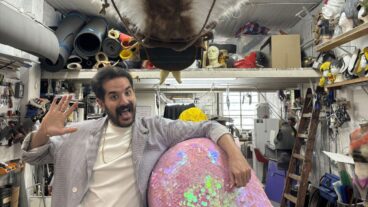One of the lions being transported from the Ramat Gan Safari to the Kalkilya Zoo last week.Nabuko, Grass and Gvir were asleep when they made their journey from Israel to Palestinian territory last week. They snored past the separation barrier, slept through the border crossing, ignored the media hoopla around them, and were slow to wake up upon arrival at their new home.
Nabuko, Grass and Gvir are three Israeli-born lions who recently transferred to the Kalkilya Zoo in the West Bank, in an act of cooperation between the Israeli and Palestinian people.
While animal transfers between zoos are commonplace, Amelia Terkel, curator for the Ramat Gan Safari, told ISRAEL21c that this particular relocation proves alliances in difficult times are possible.
“We can work together. We talk to them on the phone and they talk to us on the phone, we can help them and they can help us professionally despite the political situation,” said Terkel about the Kalkilya Zoo’s veterinarians. “In fact, we don’t hear about it, but these things (joint efforts) are happening all the time. Animals just happen to be a trigger that speaks to people. People are looking for something that will give them hope that things can return to a state of normalcy.”
The Kalkilya Zoo was set up in co-operation with Israeli zoos in the 1980s. The transfer of the lions had been planned four years ago and a deal was secured two days before the breakout of the intifada in 2000. The three male castrated lions, who Terkel says were “sidelined by the rest of the pride” at the Ramat Gan Safari Park, had to wait until last week to move house. The nine to 11-year-old lions traveled an 18-mile route few Israelis and Palestinians are allowed to cross.
“Obviously we had to cancel the transfer when violence broke out,” said Terkel, “but our contact never stopped. We have a long standing relationship with the Kalkilya Zoo. People at a professional level can talk to each other and can work together in spite of the political situation that surrounds them.”
“Even during extreme fighting, the Israeli veterinarians were in contact with me,” said Sami Khader, chief veterinarian at the Kalkilya Zoo. “They helped me solve problems in my zoo, we discussed serious problems facing my animals, and they would give me advice even while I was operating on an animal. We were in regular touch during the intifada and we are still in constant contact.”
An ibex desert goat and two zebras also made the journey – to replace animals that died of tear gas inhalation during violent demonstrations these past four years near the zoo.
The latest transfer of animals from the Ramat Gan Safari to the Kalkilya Zoo is one of a series, even during the intifada. Khader, who had just finished operating on a Syrian goat’s hernia, said the media splash surrounding this transfer was made because the kings of the animal kingdom were included.
“This is not the first time the Israeli zoo has sent me animals. During the intifada I’ve also received monkeys, an ostrich, and raccoons. But they came in small cars and this time there were big trailers so everyone knew,” Khader said.
A few days after the transfer, Khader said the new acquisitions by his zoo – the only animal sanctuary in the Palestinian Authority area – were still the talk of town.
“People are very happy. They waited a long time for the lions to come. Lots of people are coming to my clinic to ask about them, the whole city knows the lions are here,” said Khader.
“It was very moving to be there,” said Terkel, of her first visit to the Kalkilya Zoo on the day of the transfer. “Coming in – we were in a car following the truck with the animals – youngsters whooped and ran alongside the truck. It was something exciting.”
Nabuko, Grass and Gvir’s big day started just after dawn when they were tranquilized at the Ramat Gan Safari, before being loaded into cages for the trip. First, Nabuko, who weighs some 300 pounds, woke up upon being put in a cage and stuck his head in the door, making it difficult for zoo keepers to close it. Then Grass challenged the team when he refused to wake up upon arrival in Kalkilya. Even a ‘wake-up’ injection didn’t elicit a budge. The Israeli crew eventually gave up and the Palestinians promised to send the cage back within a week.
“I do believe that other exchanges between the zoos will take place in the future,” said Terkel. “Every body is just tired of the fighting. It’s one of many different ventures Israelis and Palestinians are doing. This one got the spotlight because animals are of interest to people. It?s a feel good story.”
“The lions are good,” summed up Khader. “This is a happy story.”












